Lewis Spence Quotes & Sayings
Enjoy the top 15 famous quotes, sayings and quotations by Lewis Spence.
Famous Quotes By Lewis Spence
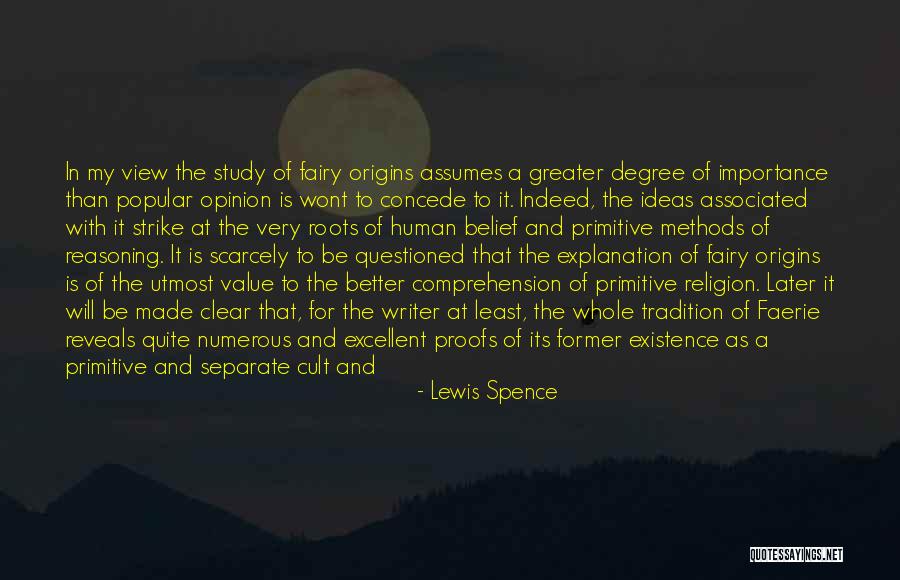
In my view the study of fairy origins assumes a greater degree of importance than popular opinion is wont to concede to it. Indeed, the ideas associated with it strike at the very roots of human belief and primitive methods of reasoning. It is scarcely to be questioned that the explanation of fairy origins is of the utmost value to the better comprehension of primitive religion. Later it will be made clear that, for the writer at least, the whole tradition of Faerie reveals quite numerous and excellent proofs of its former existence as a primitive and separate cult and faith, more particularly as regards its appearance and tradition in these islands. — Lewis Spence
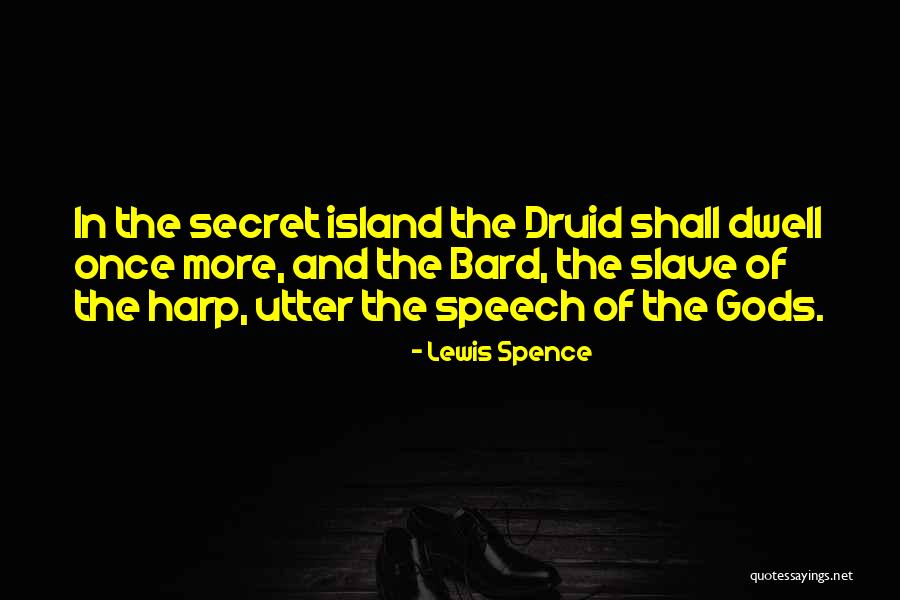
In the secret island the Druid shall dwell once more, and the Bard, the slave of the harp, utter the speech of the Gods. — Lewis Spence
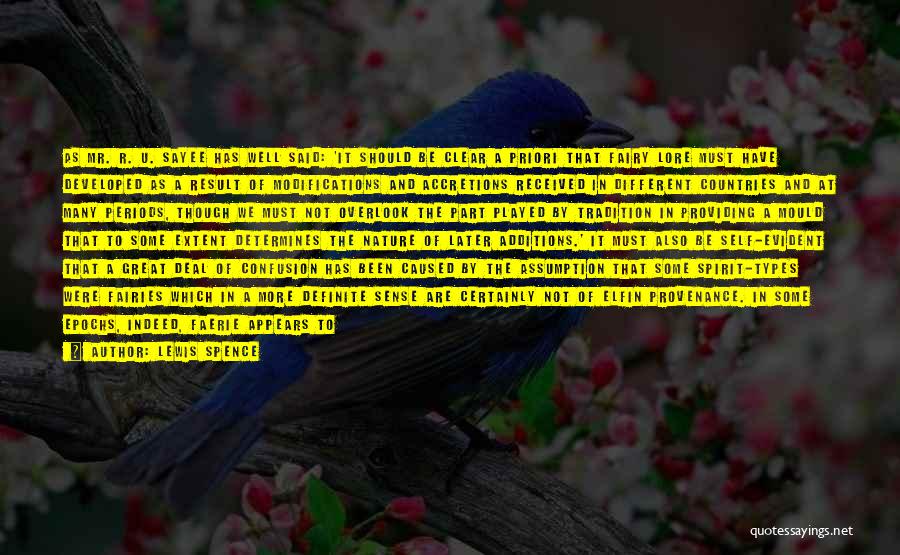
As Mr. R. U. Sayee has well said: 'It should be clear a priori that fairy lore must have developed as a result of modifications and accretions received in different countries and at many periods, though we must not overlook the part played by tradition in providing a mould that to some extent determines the nature of later additions.' It must also be self-evident that a great deal of confusion has been caused by the assumption that some spirit-types were fairies which in a more definite sense are certainly not of elfin provenance. In some epochs, indeed, Faerie appears to have been regarded as a species of limbo to which all 'pagan' spirits - to say nothing of defeated gods, monsters, and demons - could be banished, along with the personnel of Olympus and the rout of witchcraft. Such types, however, are usually fairly easy of detection. — Lewis Spence
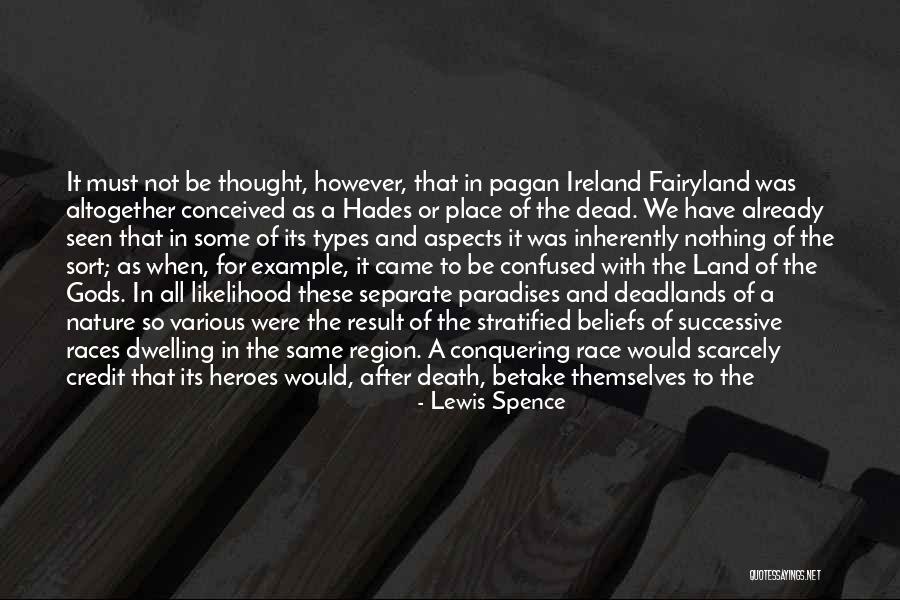
It must not be thought, however, that in pagan Ireland Fairyland was altogether conceived as a Hades or place of the dead. We have already seen that in some of its types and aspects it was inherently nothing of the sort; as when, for example, it came to be confused with the Land of the Gods. In all likelihood these separate paradises and deadlands of a nature so various were the result of the stratified beliefs of successive races dwelling in the same region. A conquering race would scarcely credit that its heroes would, after death, betake themselves to the deadland of the beaten and enslaved aborigines. The gods of vanquished races might be conceived as presiding over spheres of the dead for which their victors would have nothing but contempt, and which, because of that very contempt, might come to be conceived as hells or places of a debased and grovelling kind, pestiferous regions which only the spirits of despised "natives" or the undesirable might inhabit. — Lewis Spence
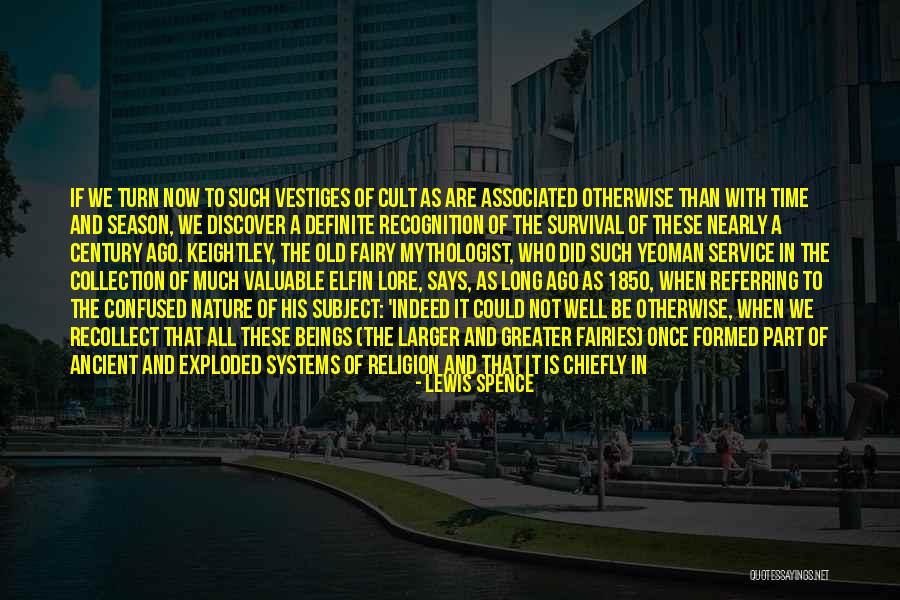
If we turn now to such vestiges of cult as are associated otherwise than with time and season, we discover a definite recognition of the survival of these nearly a century ago. Keightley, the old fairy mythologist, who did such yeoman service in the collection of much valuable elfin lore, says, as long ago as 1850, when referring to the confused nature of his subject: 'Indeed it could not well be otherwise, when we recollect that all these beings (the larger and greater fairies) once formed part of ancient and exploded systems of religion and that it is chiefly in the traditions of the peasantry that their memorial has been preserved. — Lewis Spence
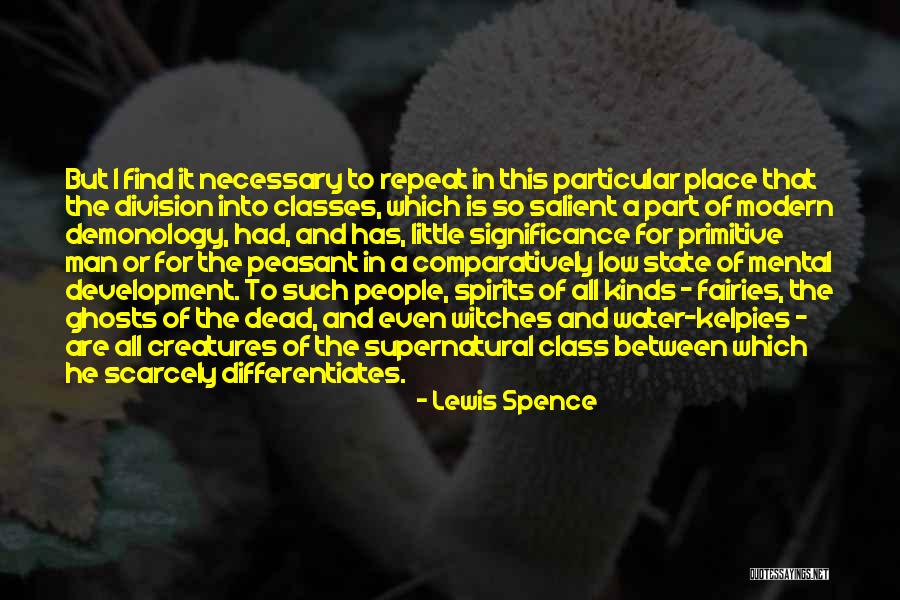
But I find it necessary to repeat in this particular place that the division into classes, which is so salient a part of modern demonology, had, and has, little significance for primitive man or for the peasant in a comparatively low state of mental development. To such people, spirits of all kinds - fairies, the ghosts of the dead, and even witches and water-kelpies - are all creatures of the supernatural class between which he scarcely differentiates. — Lewis Spence
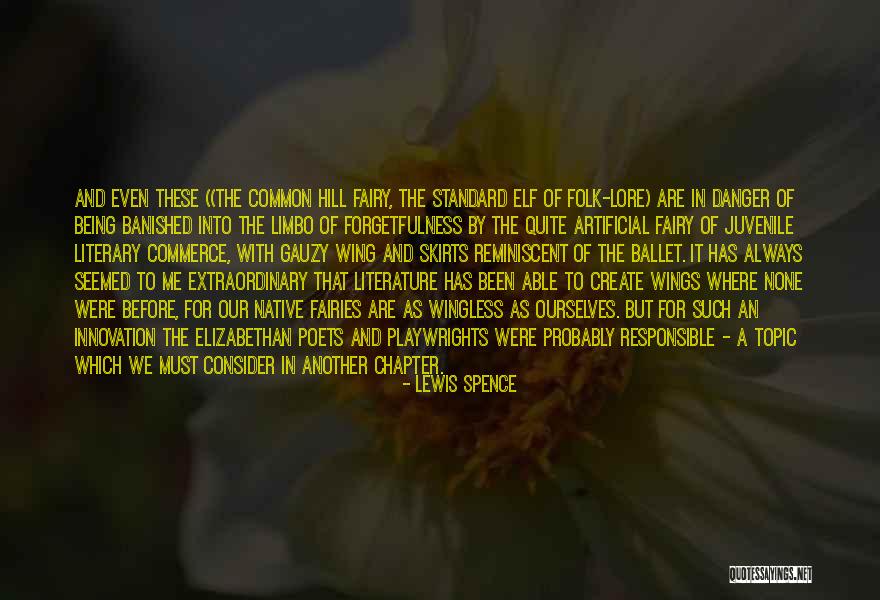
And even these ((the common hill fairy, the standard elf of folk-lore) are in danger of being banished into the limbo of forgetfulness by the quite artificial fairy of juvenile literary commerce, with gauzy wing and skirts reminiscent of the ballet. It has always seemed to me extraordinary that literature has been able to create wings where none were before, for our native fairies are as wingless as ourselves. But for such an innovation the Elizabethan poets and playwrights were probably responsible - a topic which we must consider in another chapter. — Lewis Spence
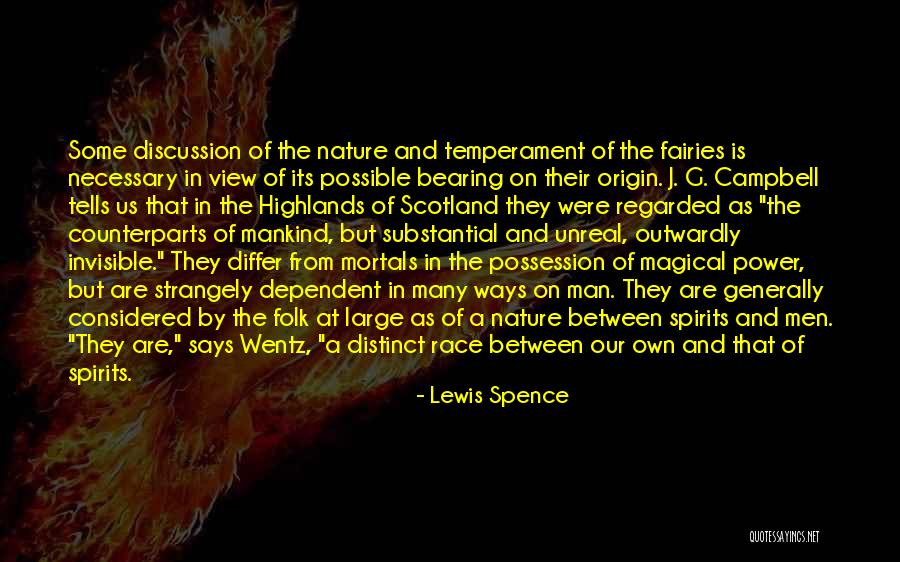
Some discussion of the nature and temperament of the fairies is necessary in view of its possible bearing on their origin. J. G. Campbell tells us that in the Highlands of Scotland they were regarded as "the counterparts of mankind, but substantial and unreal, outwardly invisible." They differ from mortals in the possession of magical power, but are strangely dependent in many ways on man. They are generally considered by the folk at large as of a nature between spirits and men. "They are," says Wentz, "a distinct race between our own and that of spirits. — Lewis Spence
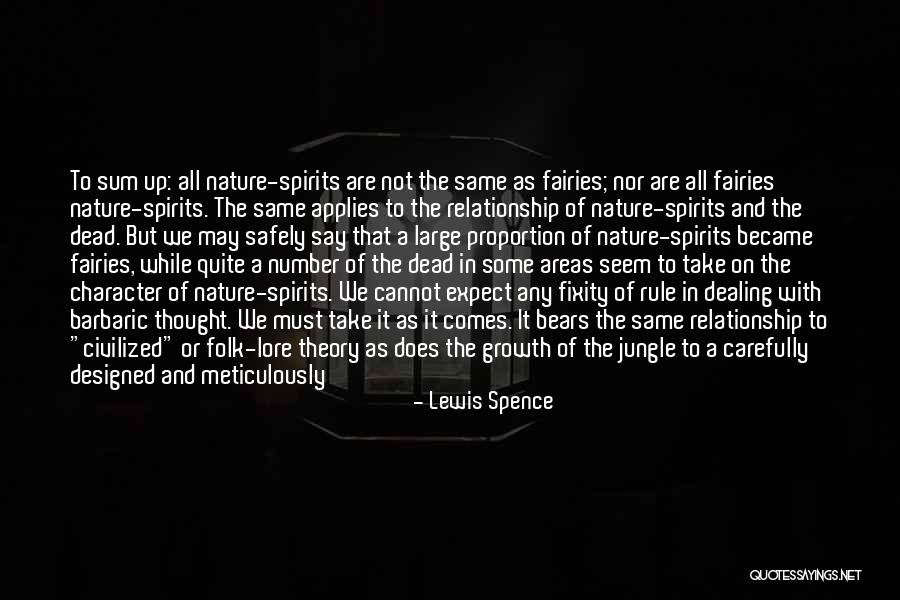
To sum up: all nature-spirits are not the same as fairies; nor are all fairies nature-spirits. The same applies to the relationship of nature-spirits and the dead. But we may safely say that a large proportion of nature-spirits became fairies, while quite a number of the dead in some areas seem to take on the character of nature-spirits. We cannot expect any fixity of rule in dealing with barbaric thought. We must take it as it comes. It bears the same relationship to "civilized" or folk-lore theory as does the growth of the jungle to a carefully designed and meticulously labelled botanical garden. As Victor Hugo once exclaimed when writing of the barbaric confusion which underlies the creative function in poetry: 'What do you expect? You are among savages! — Lewis Spence
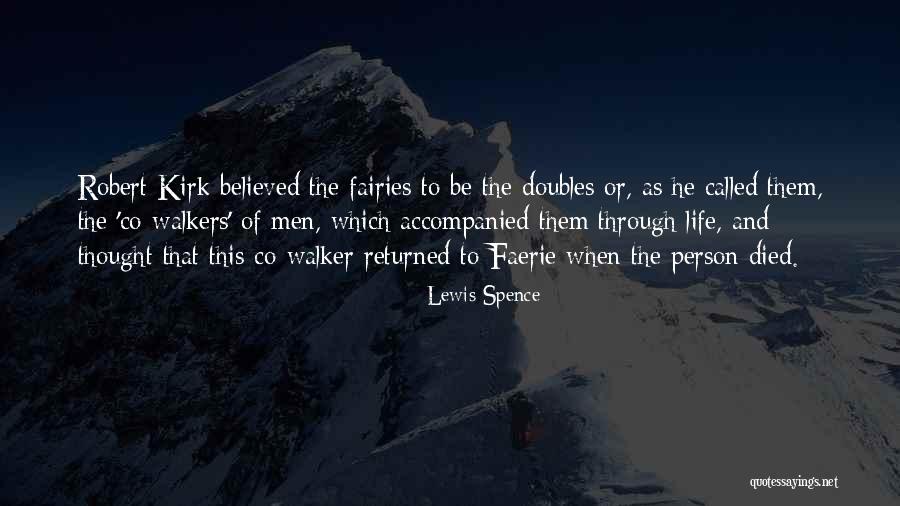
Robert Kirk believed the fairies to be the doubles or, as he called them, the 'co-walkers' of men, which accompanied them through life, and thought that this co-walker returned to Faerie when the person died. — Lewis Spence
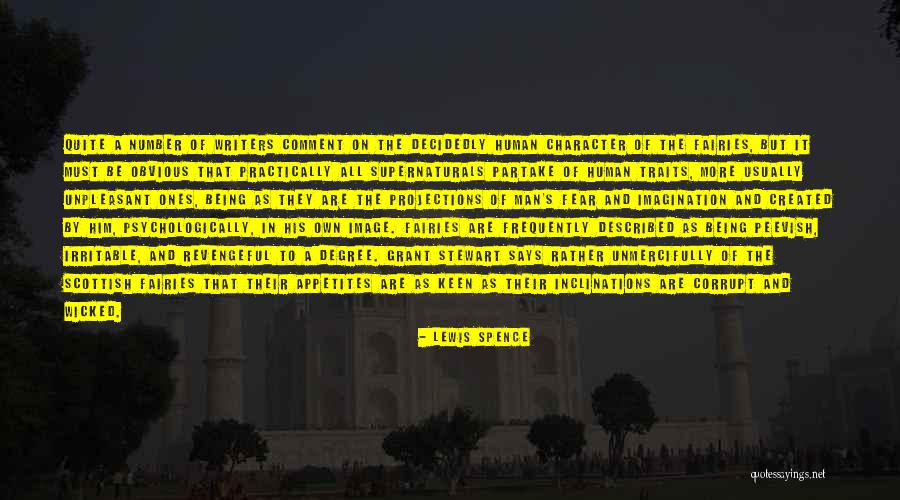
Quite a number of writers comment on the decidedly human character of the fairies, but it must be obvious that practically all supernaturals partake of human traits, more usually unpleasant ones, being as they are the projections of man's fear and imagination and created by him, psychologically, in his own image. Fairies are frequently described as being peevish, irritable, and revengeful to a degree. Grant Stewart says rather unmercifully of the Scottish fairies that their appetites are as keen as their inclinations are corrupt and wicked. — Lewis Spence
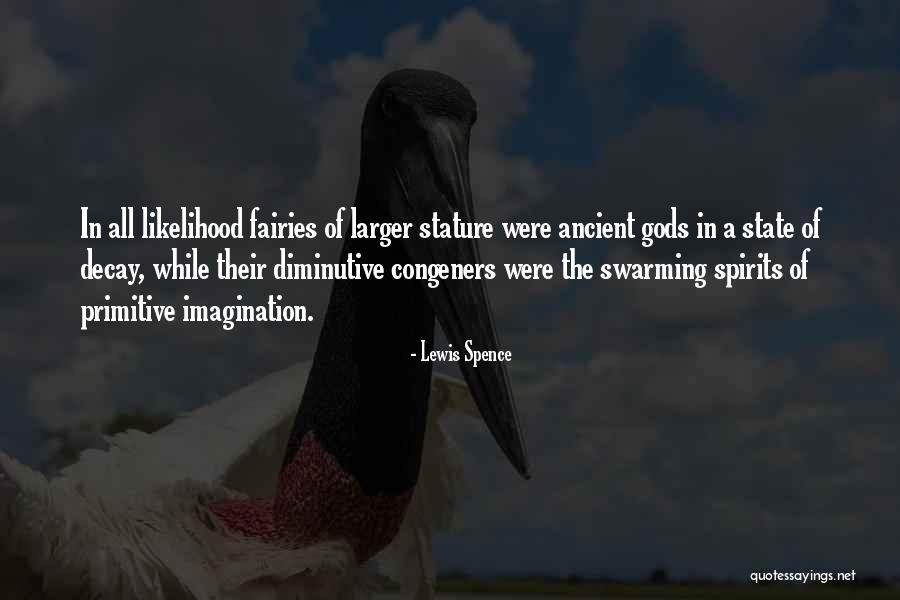
In all likelihood fairies of larger stature were ancient gods in a state of decay, while their diminutive congeners were the swarming spirits of primitive imagination. — Lewis Spence
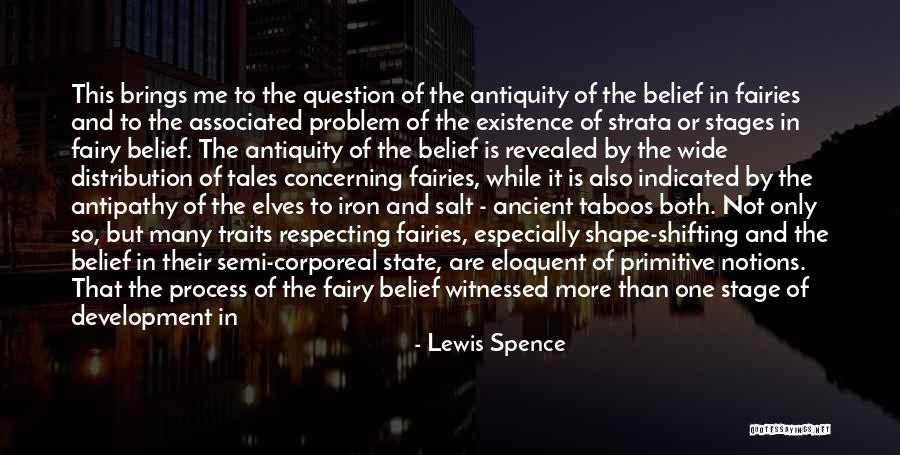
This brings me to the question of the antiquity of the belief in fairies and to the associated problem of the existence of strata or stages in fairy belief. The antiquity of the belief is revealed by the wide distribution of tales concerning fairies, while it is also indicated by the antipathy of the elves to iron and salt - ancient taboos both. Not only so, but many traits respecting fairies, especially shape-shifting and the belief in their semi-corporeal state, are eloquent of primitive notions. That the process of the fairy belief witnessed more than one stage of development in the course of successive ages appears more than probable. 'The fairies of one race,' remarks Wentz, 'are the people of the preceding race.' If this statement lacks a certain precision, one realizes the implication; that is, that the ghosts or gods of a preceding race may come to be regarded by their successors as fairies. — Lewis Spence
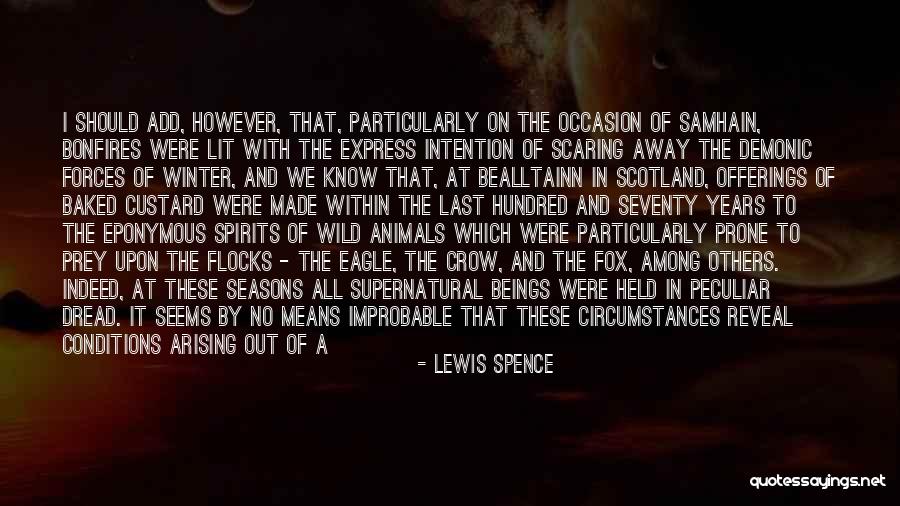
I should add, however, that, particularly on the occasion of Samhain, bonfires were lit with the express intention of scaring away the demonic forces of winter, and we know that, at Bealltainn in Scotland, offerings of baked custard were made within the last hundred and seventy years to the eponymous spirits of wild animals which were particularly prone to prey upon the flocks - the eagle, the crow, and the fox, among others. Indeed, at these seasons all supernatural beings were held in peculiar dread. It seems by no means improbable that these circumstances reveal conditions arising out of a later solar pagan worship in respect of which the cult of fairy was relatively greatly more ancient, and perhaps held to be somewhat inimical. — Lewis Spence
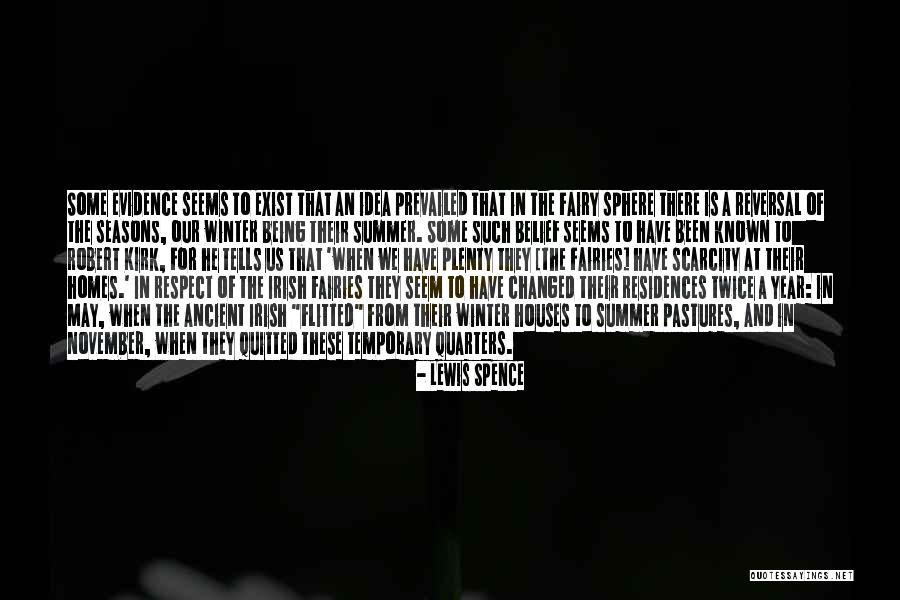
Some evidence seems to exist that an idea prevailed that in the fairy sphere there is a reversal of the seasons, our winter being their summer. Some such belief seems to have been known to Robert Kirk, for he tells us that 'when we have plenty they [the fairies] have scarcity at their homes.' In respect of the Irish fairies they seem to have changed their residences twice a year: in May, when the ancient Irish "flitted" from their winter houses to summer pastures, and in November, when they quitted these temporary quarters. — Lewis Spence





